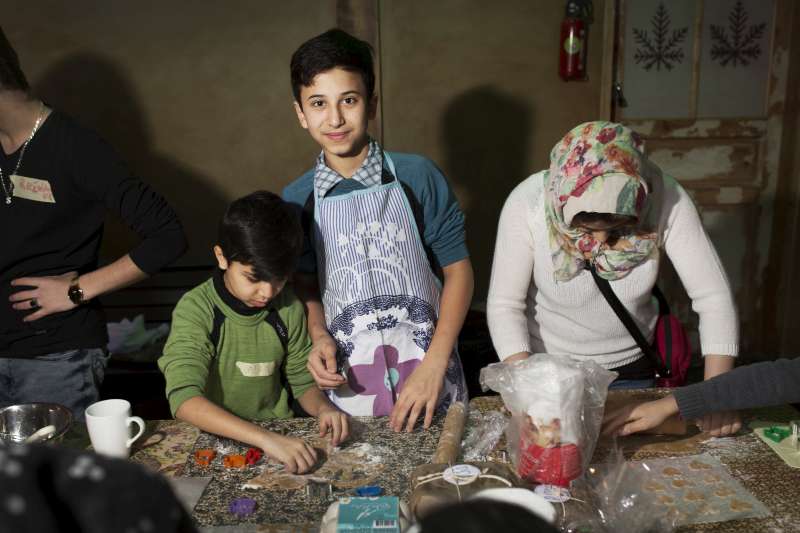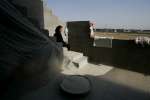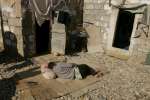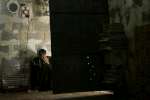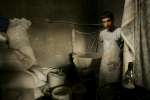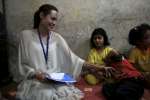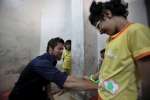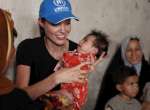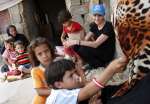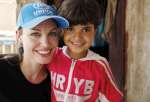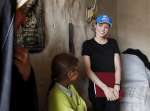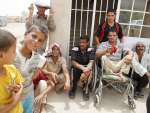Volunteers tackle prejudice against refugees in Latvia
News Stories, 14 January 2016
RIGA, Latvia, Jan 14 (UNHCR) – It once hosted parties for the Baltic and Russian aristocracy. Now the Kanepes cultural centre, an elegant building in central Riga, echoes with the sound of excited children baking traditional ginger biscuits and making gingerbread houses.
The centre takes pride in using ideas and art to challenge people's preconceptions and make them think for themselves. This time, children and ginger biscuits are raising some tricky issues for many Latvians.
That is because the bakers are asylum seekers, around 70 of whom have gathered here for a party organized by a volunteer group called I Want to Help Refugees. The activists feel they are standing up for refugee rights in a nation that is struggling to adjust to Europe's migration crisis.
I Want to Help Refugees was established by Egils Grasmanis and his wife Lana as a Facebook group in September 2015. It has swiftly grown to 2,400 members, with a core group of 30-40 activists who meet weekly to debate, among other matters, how Latvia should deal with current refugee issues.
For this event, some 30 volunteers and their friends provided a feast of food and entertainment for people from Iraq, Syria, Afghanistan and elsewhere.
"It is important to create events and conditions in which people can meet, to understand that we are actually talking about people, not abstract refugees," said Liene Jurgelane, the centre's manager.
Aiding the effort is Gasmanis's toyshop in central Riga, which has become a place for locals to bring donations including food and clothes. On two occasions, the group has hired a coach to carry refugees into the capital from the asylum centre at Mucenieki.
But the group has its work cut out. Almost three-quarters of Riga residents disapprove of asylum seekers being admitted to Latvia under the EU's mandatory relocation scheme, according to a poll by independent researcher unit, SKDS. Fewer than one in five said they approved.
Figures from UNHCR actually show that the number of asylum seekers in the country has so far been very small, with just 63 people granted refugee status in Latvia between 1998 and 2014.
In 2016, Latvia is due to receive more than 700 refugees under the relocation scheme and I Want to Help Refugees is determined to lay the groundwork for their arrival. The group sees changing attitudes as an urgent task.
"The biggest problem is that people don't have information and are very easily manipulated," lamented Grasmanis, 38.
Linda Jakobsone, 40, a communications professional and an activist with the group, shared these concerns.
"There is a lot of fear, for many reasons," she said. "When you stand in line in a shopping mall or chat to friends, whatever the topic of conversation, within a couple of minutes you get to this topic. People are afraid of the unknown. This is something very new for all of us."
However, Latvia is moving in the right direction, added Didzis Melbiksis, a consultant for the UNHCR in Riga.
He pointed out that it is a very new nation with a turbulent history and barely 15 years have passed since the country established asylum legislation. "Structures are in place," Melbiksis said. "There is now a system that is beginning to work."
At the reception centre in Mucenieki, asylum seekers are grateful for the group's work, noting that the parties are a high point for the children, while food and clothes are welcome. They have clean and warm conditions in the former army barracks, with amenities such as daily language lessons, a gym, a library, computer room and children's play room.
But they must feed themselves on Euros 2.15 a day per person, while they wait many months for a decision on their asylum claims. In October, the government cut the monthly allowance for those who receive refugee status from Euros 256 to Euros 139. The minimum wage is Euros 370.
"We didn't take risks just to get a better life, or came here to take some money, this is not true," said Max, 23, a student from Syria. "We had a good life in Syria, but this war changed everything. We ran away from our country not for money, we just want to live in peace. That is all."
There is no refugee crisis in Latvia, but rather a political crisis related to refugees, explained Elmars Svekis, whose wife keeps in frequent touch with women from refugee families. "You need to lower it to a human level and that's where you begin to understand. It is very important that there are people who can reach out and help refugees integrate in daily life," he said.
Despite the challenges, I Want to Help Refugees is making progress, tapping into a latent well of generosity among Latvians. "I didn't think Latvians were so generous," said Zdanovska about all the gifts and donations. "It's amazing how good people are."
For Grasmanis, the refugee issue will also help bring Latvians together by showing how unity is more important than division.
"If we were united as a nation, all ethnic groups, Latvian-speakers and Russian-speakers, would be much stronger, more confident, and more willing to help others," he said.
"But for now we are focused in giving refugees the help that is needed. And so far it is working very well."
By David Crouch, Latvia





